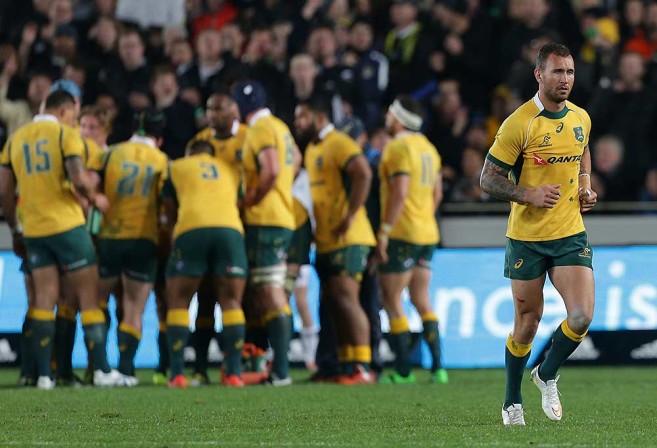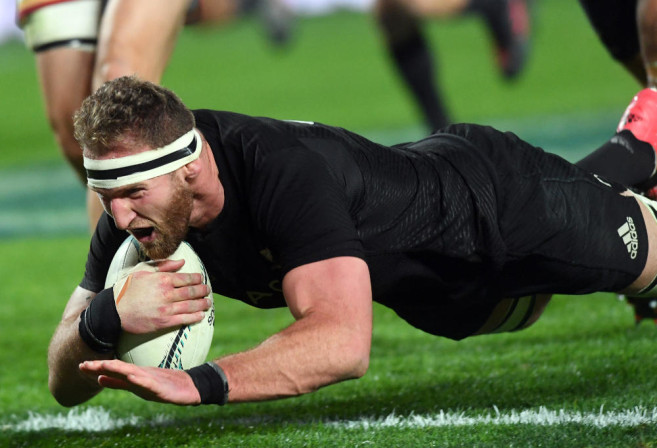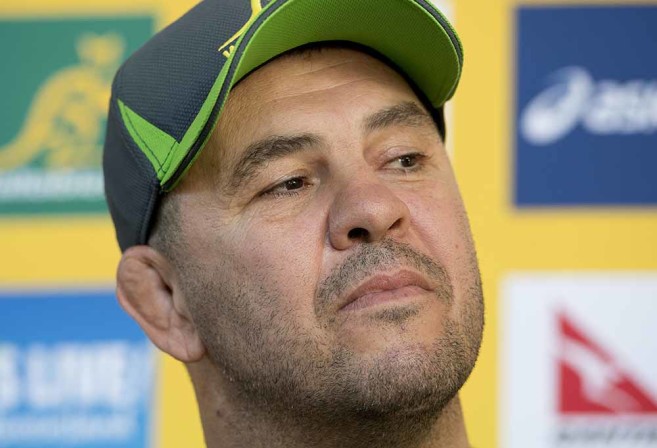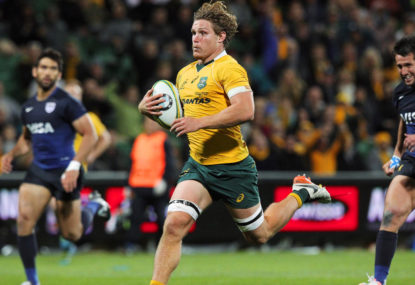The Wallabies can beat the All Blacks at Eden Park on Saturday. But they won’t. Only in their dreams will this happen.
The All Blacks are gunning for 18 straight Test wins, which will be a record for a top tier rugby power. And it would be a rugby upset to match the Japan-South Africa boilover at the 2015 Rugby World Cup tournament if the Wallabies somehow get up to defeat them.
The ‘can’ element in the equation takes into account that in a match between two teams, it is theoretically possible for the least favoured side to win.
In the case of this significant Test, the fact is, as the New Zealand rugby writer Marc Hinton pointed out in The Sun Herald, the Wallabies have three times ended historic consecutive Test wins by the All Blacks. So there is some practice in the theory.
In 2010 the All Blacks run of 15 Test wins in a row was stopped at Hong Kong when the Wallabies won 26-24.
Then in 2012 the Wallabies stopped a run of 16 Test wins with a 18-18 draw at Brisbane.
In 2012, an All Blacks run of a record-equalling 17 Tests wins was stopped by the Wallabies when they drew 12-12 at Sydney.
As Marc Hinton explains: “The Wallabies, in other words, have become specialist streak busters.”
The last time the All Blacks lost was at Sydney in 2015 when the Wallabies, using their two-number 7s method (David Pocock and Michael Hooper), won a splendid 27-19 victory. A resounding All Blacks victory at Eden Park a week later was the start to their current sequence of Test wins, however.
So much for the ‘can’ aspect of the equation.
Now to the ‘won’t’ argument.
In their current 17-Test winning run the All Blacks have beaten the Wallabies four times. According to Hinton, the combined scores from these Tests are All Blacks 146 – Wallabies 47. This breaks down to an average winning margin of a fraction under 25 points a Test.
This sequence of convincing wins suggests that the All Blacks, at home and away, have the wood on the Wallabies and that the best the Wallabies can hope to achieve is parity with New Zealand for about an hour into the Test before the floodgates open.

Then there is the Eden Park hoodoo factor.
The last Wallabies victory against the All Blacks at Eden Park was in 1986 when Alan Jones’ great team (Simon Poidevin, Nick Farr-Jones, Michael Lynagh and David Campese) won 22-9 to win the Bledisloe Cup and achieve the first (and only) three-Test winning series against the All Blacks in New Zealand.
Incidentally this wonderful Wallabies side is celebrating the 30th anniversary of this historic series win with a special lunch at the SCG on Wednesday 19th October.
The Wallabies have lost 13 consecutive Tests at Eden Park since 1986.
Moreover, since their defeat by France in 1994, 23-20, the All Blacks have been undefeated in 36 Tests. The closest they have come to losing at Eden Park in this time was an 18-18 draw against the Springboks in 1994. This is the last time, too, the All Blacks have failed to score a try at Eden Park.
My attitude to hoodoos is that they are there to be broken. (Click to Tweet)A hoodoo that has run as long as the Eden Park factor for the Wallabies must be closer to its end than to its beginning, you would think.
But there is an element of the self-enforcing of the hoodoo when it runs as a long as 30 years, as in this case of the Wallabies chasing a victory at Eden Park. A 30-year hoodoo takes on a life of its own and becomes harder to knock over than, say, a three year hoodoo.
Clearly, the New Zealand Rugby Union had this syndrome in mind when it organised the schedule of Tests in New Zealand for the 2016 The Rugby Championship.
The usual venue for the New Zealand Bledisloe Cup Tests after the opening match against the Wallabies is Eden Park. But this year that Test was played at Wellington.
The home Tests against the Springboks and the Pumas were played at other venues, too, and this program allowed for the third Bledisloe Cup Test to be allocated to Eden Park.
It just so happened that if the All Blacks were unbeaten in TRC this third Bledisloe Cup Test in 2016 would coincide with the 18th Test in a 17 Test winning sequence. And the 18th Test win, if achieved, would create a new record for top tier rugby nations.
The All Blacks have done their part to make the planning come off by winning away in Australia, South Africa and Argentina.
So now they go into Saturday’s Test with the confidence on winning all their TRC matches by bonus margins. This is an unprecedented achievement. Their last Test, moreover, was a record victory at Durban against a Springboks side that defeated the Wallabies the Test before.
In the 2016 TRC tournament, the All Blacks scored 38 tries, more tries than the other three sides (the Wallabies, the Springboks and the Pumas) scored combined.
This attack was matched by a devastating defence which conceded only five tries in the tournament.

In my opinion and in the opinion of greats like Sean Fitzpatrick the 2016 All Blacks are a better side than the team that won the 2015 Rugby World Cup tournament. It is a more complete side on attack and defence, as the statistics indicate.
On attack, they have added a powerful driving maul to their forward play. The Springboks could not handle this driving maul at Durban.
The Wallabies will be steam-rolled, too, if they can’t come up with a better response to those they have given at Sydney and Wellington when the All Blacks mauled against them.
Beauden Barrett has brought an x-factor to the All Blacks number ten jersey that was so effective for Dan Carter in 2005 against the British and Irish Lions. The tactic of using multiple first receivers and having Barrett and Ben Smith running off them has proved extremely difficult for sides to cope with this year. This is reflected in the record number of tries the side has scored.
On defence, the All Blacks have perfected (seemingly) the press/rush defensive system first put in place for the 2015 Rugby World Cup tournament. The Springboks at Durban, for instance, never once looked like scoring a try while they conceded nine to the All Blacks.
Off the field, too, the All Blacks have put in better systems to ensure that the players respond with ultimate performances in the hard grind of playing Test matches virtually every week for a couple of months in four different countries.
For the crucial Sydney Test against the Wallabies, for instance, the All Blacks arrived in Australia on the Sunday, instead of the usual Thursday. The management decided that arriving earlier in Sydney and settling in for a week might lift the All Blacks performance.
They were mindful of the Test loss in 2015 in this planning.
After their devastating win in the Sydney Test the All Blacks management insisted that the change in their touring arrangements, coming to Sydney a week before the Test, was an important ingredient in the win.
On Sunday afternoon the ARU sent out to journalists the media arrangements for the Wallabies up to Saturday’s Test. The announcement indicated that the Wallabies are flying out on Thursday, their traditional day for travelling.
When I read this I wondered why there was no consideration given to what the All Blacks had done in coming to their Test city much earlier than usual. It seems to me that matters like this, small in the greater scheme of things, seem to be overlooked by the Cheika team.
Of course, if you get a great number of small things right, something that the All Blacks do better than any other team in world rugby, it adds up in time to a large improvement in the way the team is managed. In turn, this large improvement in management is reflected by significant improvements on the field.
We won’t know until the middle of the week what the team is to play the All Blacks.
Again, hopefully, Cheika is prepared to use this Test as an experiment to find his best side to launch their assault on the Grand Slam on the November tour of the UK and France.

By the best side, I mean changes in the forwards and the backs from the side that played so erratically against the Pumas at Twickenham.
But I doubt this will happen, even though if the usual suspects play in their usual positions it is likely that the Wallabies will be thrashed.
Will Genia is out for Eden Park. Presumably, Cheika will play Nick Phipps at halfback. I would actually start with Nick Frisby. But he has had little rugby, unfortunately, over the last two months.
Phipps is a hot head who overplays the emotional side of things on the field, at the expense of the control that a limited side like the Wallabies need from their influential players.
If there is a weakness in the current All Blacks side it is their defence around the rucks. The Phipps of a couple of years ago with his running game and Frisby, possibly even now with his footwork and speed when he decides to run, could exploit this weakness.
But whether this ‘could’ can be turned into ‘will’ exploit is another matter.
Wayne Smith, the All Blacks defensive coach, is aware of the weakness. Presumably it will be harder for the Wallabies to exploit than it was for the Pumas in their Test against the All Blacks in New Zealand when for 50 minutes they had the local side rattled, to the point of looking like they were heading for a defeat.
It seems like a long time ago now but for the first TRC Test at Sydney the Wallabies had a backline with Will Genia as halfback, Bernard Foley and Matt Giteau as the five-eighths, Tevita Kuridrani as centre and Adam Ashley-Cooper on the wing.
Someone, probably Phipps, will replace Genia.
The five-eighths, unfortunately, are likely to be Quade Cooper and Foley. I say “unfortunately” because, like Mark Ella, I don’t think this smallish combination with two playmakers suits the modern power game method.
Personally, I’d like to see either Cooper or Foley at number 10, Samu Kerevi and Reece Hodge in the centres, Israel Folau on the wing, a flier on the other wing and Dane Haylett-Petty at fullback.
The Eden Park Test would be a good time to try out this line-up. The Test really means more to the All Blacks than it does for the Wallabies. The Wallabies need to experiment on Saturday to find out clues to their best side for the Grand Slam Tests. They also need a backline that can challenge the All Blacks by running hard at them.
Apparently, David Pocock and Sean McMahon are available for the Eden Park Test. I would play Pocock, who has had a tough year with injuries, on the reserves bench and play Michael Hooper as the starting number 7. This would give coach Cheika the option of playing the two number 7s together, or making a substitute of Hooper, later on in the Test.
If the two number 7s played together, I would play Pocock at number 7 and Hooper probably as a nominal number 8. He plays wider in the mode of a number 8, anyway. Pocock, because of his lack of pace, can’t play wide so he is better left to be on the ball in the middle of the field.
Aside from the selection issues, Cheika has to decide how the Wallabies want to confront the All Blacks at Eden Park.
In the second Test this year at Wellington, the Wallabies adopted the niggle approach. It worked in so far as the score line did not explode against them as it did at Sydney.
But the All Blacks will be expecting these tactics and will have worked out a response to master them. Moreover, the niggle is not going to actually win the Wallabies a Test. At best, it could keep the score line of a defeat within a respectable limit.
The great weakness is the current Wallabies coaching set-up is the lack of any tactical acuteness. There is no cleverness in the way the Wallabies play, or in the way the team is selected.
In the SMH some weeks ago I suggested that Rod Macqueen be brought into the coaching staff, possibly as a selector rather in the mode of Grant Fox with the All Blacks.
Brett Harris in The Australian has recently suggested that Phillip ‘Chook’ Fowler, the guru who plotted Ewen McKenzie’s Reds to their first and only Super Rugby tournament triumph in 2014, be brought into squad to prepare specific game plans for specific teams, something he has done successfully for international sides as well as the Reds.
Both these appointments would make the Wallabies much stronger, on and off the field.
Sun Tzu, the mythical Chinese general, stated as an axiom of successful warfare: The battle is won before it is fought.
One of the reasons why the All Blacks have defeated the Wallabies so consistently since 2003 is that their coaching staff has generally out-coached their Wallabies equivalents.
I suspect that this dominance in planning and coaching will be maintained until Cheika brings in some brain power to the coaching panel.
Right now, though, the firepower on and off the field belongs to the All Blacks. And for this reason the Eden Park hoodoo against the Wallabies will continue with a ritual Saturday night massacre by the All Blacks.
































































































